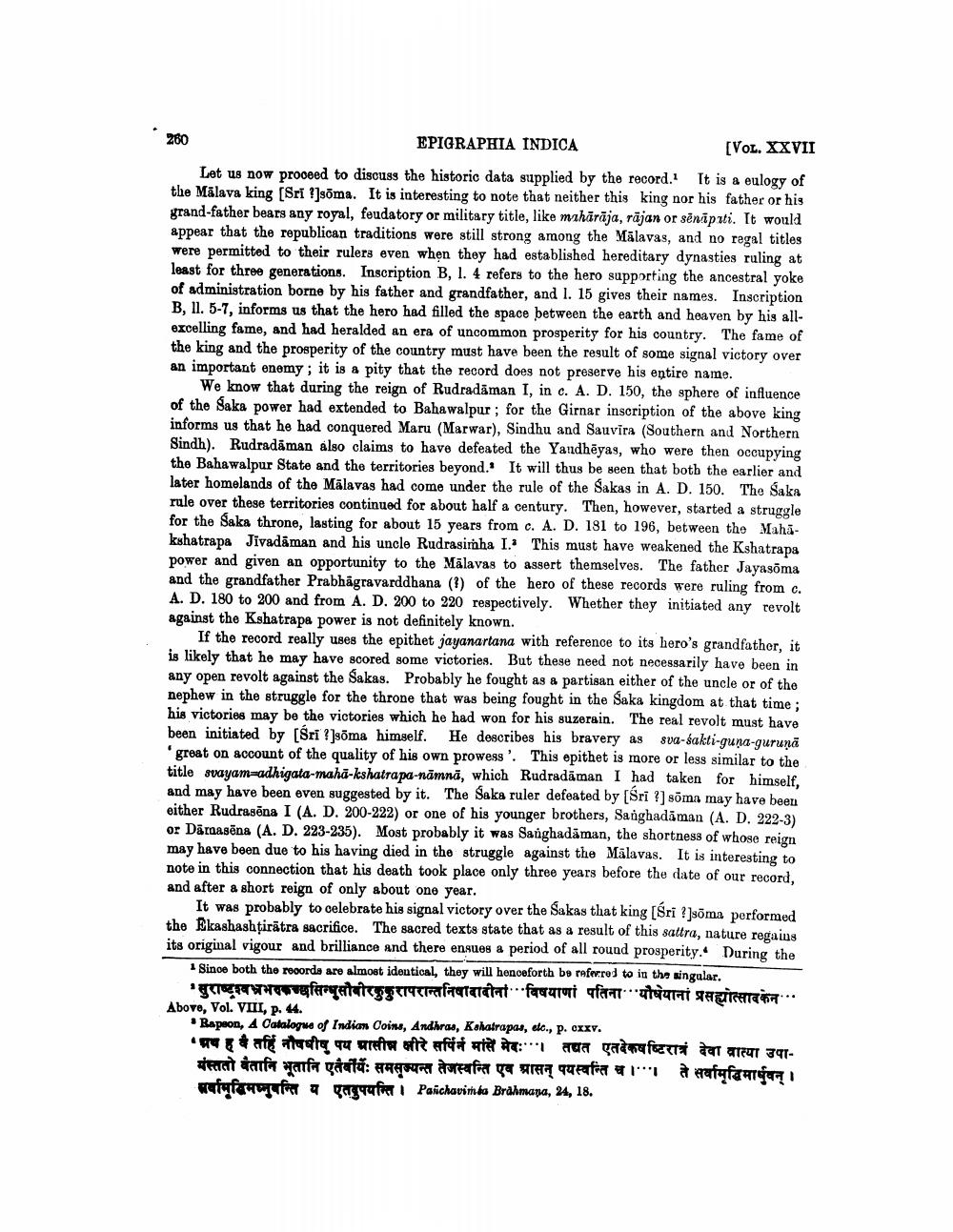________________
260
EPIGRAPHIA INDICA
[VOL. XXVII
Let us now proceed to discuss the historic data supplied by the record. It is a eulogy of the Malava king [Sri ?]soma. It is interesting to note that neither this king nor his father or his grand-father bears any royal, feudatory or military title, like mahārāja, rajan or senapati. It would appear that the republican traditions were still strong among the Malavas, and no regal titles were permitted to their rulers even when they had established hereditary dynasties ruling at least for three generations. Inscription B, 1. 4 refers to the hero supporting the ancestral yoke of administration borne by his father and grandfather, and 1. 15 gives their names. Inscription B, 11. 5-7, informs us that the hero had filled the space between the earth and heaven by his allexcelling fame, and had heralded an era of uncommon prosperity for his country. The fame of the king and the prosperity of the country must have been the result of some signal victory over an important enemy; it is a pity that the record does not preserve his entire name.
We know that during the reign of Rudradaman I, in c. A. D. 150, the sphere of influence of the Saka power had extended to Bahawalpur; for the Girnar inscription of the above king informs us that he had conquered Maru (Marwar), Sindhu and Sauvira (Southern and Northern Sindh). Rudradaman also claims to have defeated the Yandheyas, who were then occupying the Bahawalpur State and the territories beyond. It will thus be seen that both the earlier and later homelands of the Malavas had come under the rule of the Sakas in A. D. 150. The Saka rule over these territories continued for about half a century. Then, however, started a struggle for the Saka throne, lasting for about 15 years from c. A. D. 181 to 196, between the Mahakshatrapa Jivadaman and his uncle Rudrasimha I. This must have weakened the Kshatrapa power and given an opportunity to the Mälavas to assert themselves. The father Jayasōma and the grandfather Prabhagravarddhana (?) of the hero of these records were ruling from c. A. D. 180 to 200 and from A. D. 200 to 220 respectively. Whether they initiated any revolt against the Kshatrapa power is not definitely known.
If the record really uses the epithet jayanartana with reference to its hero's grandfather, it is likely that he may have scored some victories. But these need not necessarily have been in any open revolt against the Sakas. Probably he fought as a partisan either of the uncle or of the nephew in the struggle for the throne that was being fought in the Saka kingdom at that time; his victories may be the victories which he had won for his suzerain. The real revolt must have been initiated by [Sri?]soma himself. He describes his bravery as sva-sakti-guna-guruṇā 'great on account of the quality of his own prowess'. This epithet is more or less similar to the title svayam-adhigata-maha-kshatrapa-nämnä, which Rudradaman I had taken for himself, and may have been even suggested by it. The Saka ruler defeated by [Śri ?] soma may have been either Rudrasena I (A. D. 200-222) or one of his younger brothers, Sanghadaman (A. D. 222-3) or Dāmasēna (A. D. 223-235). Most probably it was Sanghadaman, the shortness of whose reign may have been due to his having died in the struggle against the Maälavas. It is interesting to note in this connection that his death took place only three years before the date of our record, and after a short reign of only about one year.
It was probably to celebrate his signal victory over the Sakas that king [Śri ?]soma performed the Ekashashtirätra sacrifice. The sacred texts state that as a result of this sattra, nature regains its original vigour and brilliance and there ensues a period of all round prosperity.
During the
1 Since both the records are almost identical, they will henceforth be referred to in the singular. gengewwwwwwyfingahuteggereerafaatandet foret after ablamat saghmeier
•
Above, Vol. VIII, p. 44.
Rapson, A Catalogue of Indian Coins, Andhras, Kshatrapas, etc., p. cxxv.
'अथ ह वै तर्हि नौषधीषु पय प्रासीन्न क्षीरे सर्पिनं मांसे मेवः । तद्यत एतदेकषष्टिरात्रं देवा व्रात्या उपामंस्ततो बतानि भूतानि एतंवीर्यः समसूम्यन्त तेजस्वन्ति एवं ग्रासन् पयस्वन्ति च । ते सर्वामृद्धिमार्बुवन् । सर्वामुद्धिमनुवन्ति य एतवुपयन्ति। Pahichavimba Brahmaya, 24, 18.




